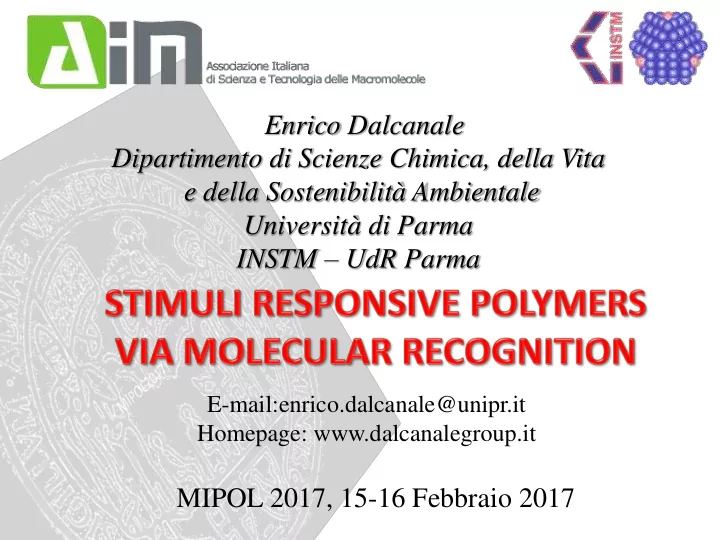

Enrico Dalcanale Dipartimento di Scienze Chimica, della Vita e della Sostenibilità Ambientale Università di Parma INSTM – UdR Parma E-mail:enrico.dalcanale@unipr.it Homepage: www.dalcanalegroup.it MIPOL 2017, 15-16 Febbraio 2017
The basic science: Host-guest homopolymers The application side: Polymer blending Self-diagnostic polymers
Bond reversibility brings in new properties: self-healing low process viscosity Meijer et al ., Science, 1997 , 278 , 1601.
Hydrophobic interactions: • Cyclodextrins • Cucurbiturils Specific host-guest interactions: • Crown ethers • Calixarenes • Cavitands Requirement for true polymerization: Ka>10 5
F. Tancini, E. Dalcanale in Supramolecular Polymer Chemistry. Bridging Words (A. Harada Ed., Wiley-VCH 2012 , 71-93)
Tiiii[R 1 , R 2 , R 3 ] Eur. J. Org. Chem. 2004 , 451; Chem. Soc. Rev. 2007 , 36 , 695; Acc. Chem. Res. 2013 , 46 , 399
X-Ray of Tiiii • N-methyl pyridinium salt JACS 2009 , 13 1,7447
Crystal structure of Tiiii • sarcosine hydrochloride complex from MeOH/H 2 O PNAS 2012, 109 , 2263; J. Am. Chem. Soc. 2016 , 138 , 8569
Homopolymers Angew. Chem. Int. Ed. 2008 , 47 , 4504 Copolymers Chem. Eur. J. 2010 , 16 , 14313
M ONOMER S TOPPER Tiiii TSiiii
S TOPPER TSiiii X- Ray of TSiiii•CH 3 CN Crystal packing of TSiiii
Host-Guest Dimer K (M -1 ) (4.0± 0.1) • 10 7 ∆H -30.0 ± 0.1 T • ∆S 13.4 ± 0.5 ∆G -43.6 ± 0.5 N 0.81 ± 0.01 Values in KJ mol -1 in CH 2 Cl 2 Structure confirmed by NOESY -NMR and ESI-MS spectra.
CHCl 3 Homopolymer I - , PM monomer = 1463, dn/dc =1.52 mM <N> MW 3.06 11 16140 4.18 12 17740 5.06 13 19280 6.9 15 22410 10.2 18 26270 14.5 20 28650 n Static Light Scattering measurements of the weight-average molecular weight of linear polymer No aggregation in DMA or acetone Minimal aggregation in CHCl 3 (2-3 units max at high conc.)
28000 polymer growth by increasing the 26000 concentration polymer MW control by chain stopper 24000 addition 22000 20000 MW 18000 16000 14000 12000 10000 0 5 10 15 20 Concentration g/L We performed Static Light Scattering in a concentration range between 1 g/L (0.7mM) and 15 g/L (10mM) reaching degree of polymerization dp=18 (>27000 Da). n n-x
Monomer length from X-ray: 15 Å Stopper length via PGSE in acetone-d 6 : 14.9 Å
In CH 3 CN 1 H-NMR assembly-disassembly in CDCl 3
n + n n n Star shaped polymer MW MW Ratio g/L homopolymer star shaped polymer 1,04 11850 46210 3,8996 n 2,05 13490 41600 3,0838 4,10 15940 49700 3,1179 Static Light Scattering measurements of the weight-average molecular weight of star-branched polymer
Problem: minimize interfacial energy to reduce the propensity for phase separation Macromolecules 2014 , 47 , 632
K a = 5 . 10 7 M -1 2,7-diamido- 1,8-naphthyridine Molecular Level Mixing Driven by H-Bonding Guanosine T. Park, S. C. Zimmerman, J. Am. Chem. Soc. 2006 , 128 , 11582
Mn Mw PDI 27300 40000 1.47 Ratio m/n = 40 (2.5% molar ratio) verified by 1 H NMR and N elemental analysis
Mn Mw PDI 20800 27100 1.30 Ratio m/n = 40 (2.5% molar ratio) verified by 1 H NMR and P elemental analysis
10.22 1.25 eq. Monotopic Guest 0.5 eq. Monotopic Guest 0.25 eq. Monotopic Guest 8.70 Host copolymer 30 20 10 0 1)
.0 10.0 (f1) CDCl 3 RT
Sample Mn mol/mL Tg Rough (Rq) 9.2∙10 -4 26 ° C PBMA 21500 8.16nm T= 12°C Sample Mn mol/mL Tg Rough (Rq) 9.2∙10 -4 95 ° C PS 21000 10.99nm
mixture 1:1 PS+PBMA Substrate: silicon oxide PBMA PS T= 12°C Chen et al. Langmuir 2002 , 18 , 1302 Zimmerman et al. JACS 2006 , 128 , 11582
Tg ° C Sample PS 95 PBMA 26 PS- 26 PBMA 96 1.1
T= 12°C Sample Mn mol/mL Tg Rough (Rq) 9.2∙10 -4 20 ° C PBMA- 27300 12.08nm guest Sample Mn mol/mL Tg Rough (Rq) 9.2∙10 -4 97 ° C PS-host 20800 6.45nm
+ 1:1 molar ratio + 1:1 molar ratio
Tg ° C Sample PS-host 97 PBMA-guest 25 PS-host + PBMA-guest 40 1:1 PS-host + PBMA-guest 58 2:1 PS-host + PBMA-guest 32 1:2
1:1 mixture PS-host+PBMA-guest NOT METHYLATED
PS-host + PBMA-guest PS-PBMA White = PS PS-host + PBMA-guest Brown = PBMA Not methylated 20 nm height difference
Tg ° C Sample PS-host 97 PBMA-guest NOT 20 methylated PS-host + PBMA-guest 20 NOT 95 methylated 1.1
Electrochemical Stimulus Solid-liquid interface Soft Matter 2016 , 12 , 5353-5358
2° 1 V/min 1° All scans after the first one are reproducible
Reference electrode: Ag/AgCl ; Auxiliary electrode: Pt Working electrode: deposited blend Solvent: water; Supporting electrolyte: NaCl 0,1 M Scan rate: 200mV/s Cathodic Peak
Assembled copolymer coated Disassembled copolymer on gold plate before reduction coated gold plate before at 90 ° C reduction at 90 ° C -0,8 V 90 °C Average roughness: 1.91 nm Average roughness: 11.1 nm Nota Bene: no disassembly below PS – Host Tg
AFM non-contact mode PS-Host/PBMA-Py PS-Host/PBMA-Py reduced at 90°C
AFM non-contact mode Topography Phase
AFM tapping mode Larger and deeper segregation zones appear
is a powerful tool in materials science Functional polymers require a molecular level understanding and control of the weak interactions in the and at leading to Key features of cavitand-based materials are:
+ + + + Roger Mbanda Daniele Masseroni Francesca Tancini
Marco Dionisio Andreas Früh
Crystal structures AFM measurements University of Trieste University of Parma (Synchrotron) D. Orsi S. Geremia G. Cristofolini N. Demitri Electrochemistry University of Parma M. Giannetto SUPRABARRIER DIC measurements University of Parma R. Brighenti Polymers MW characterization University of Pisa G. Ruggeri/ L. Ricci
Recommend
More recommend